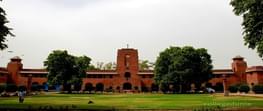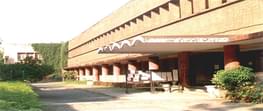Dr. Anjali Raman is the Teacher-In-Charge at Shivaji College. She earned an M.Phil. in 2000 and qualified for the NET in the same year. Furthermore, Dr. Raman earned her PhD in the year 2016 in research areas of Ecology, Environment and Philosophy and Literature. She has published 13 papers, one chapter in a book in her area of interest.

Being a Faculty of your Department, what are your roles and responsibilities towards the students?
I feel that educators have a big responsibility to the students. It’s almost as if along with parents we must guide them to a more fulfilling life and even give them the right tools to face the challenges thrown at them. The pupils are like clay in the hands of the potter(teacher)who has to mold them to become upstanding individuals.
How do you try to bring in practical approach towards subjects and make it industry oriented?
Nowadays in the new curriculum, we have subjects with a practical component. For example, for public speaking in English, you need to be competent enough to give an introductory speech or a farewell speech. If you have opted for a business communication course then your official letter-writing skills should manifest itself at the end of the training. You need to have training to practice your theoretical skills which we make a point to teach to our students.
What are the best practices offered by the department to the students which help them gain the necessary skills?
We motivate students to attend class regularly, and be participative in and out of class. We organize educational excursions, orientation programs for first year students. They also take part in department events such as quizzes, debates, and poetry, which are stimulating as well as fun.
How do you help your student to cope up with the competition being so high in the outside world?
We give our students the skills to face the challenges of the world in a non-aggressive way. They are taught to hone their emotional quotient which is almost as important if not more than intelligence quotient. Finally, they are taught to strike a work-life balance and contribute to the betterment of the underprivileged in addition to improving their own family status and standing in the world.
Check Shivaji College Placement
What are the challenges you faced/ are facing to uplift the quality of education of your department?
The industry is constantly changing and keeping up with it is a challenge. We also need to teach our students the right skills and education to have a competitive edge. Our curriculum keeps changing every few years. The teachers need to keep abreast with the changing times and current trends to teach the classes better. Our evaluation pattern too is revised every few years to be in tune with evolving times.
What do you see the department’s/ college’s greatest strengths and how it can be enhanced?
The college’s strengths include its green spaces, its academic life, its sports grounds, and its accessibility to major metro stations. Additionally, the traffic near about is quite manageable, last-minute connectivity is provided by e-rickshaws. The faculty are also quite caring and helpful to all students.
What valuable advice would you like to the students for them to have a prosperous career ahead?
Students should not take any kind of setbacks or failures to heart. If at first, they don’t succeed, there’s always a next time, perseverance is the key to success in this overcrowded world. In addition, they must practice yoga or meditation to relax their frayed nerves in dealing with the hurry-scurry of day-to-day life.
How does the department/College enhance the skills of the faculty and prepares them according to the industry standards?
The Shivaji College and the affiliating university regularly conduct refresher courses. We invite talented individuals from all fields to train and motivate faculty which helps in enhancing the skills of the faculty. Our students and teachers also get to network with these experts and get the right knowledge to advance their careers.
Check Shivaji College Fees & Eligibility
What are the interventions and approaches you bring in apart from curriculum to train/teach the students?
Our talented teachers are engaged in the remedial cell of the college where they impart an added push to academically weaker students. We also have a cell for imparting coaching to those interested in UPSC. The teachers are always ready to answer student’s queries and doubts.
How do you ensure that the courses offered at the college are up-to-date and aligned with industry trends and demands? Are there any mechanisms in place for regular curriculum review and updates?
As mentioned, our curriculum changes every few years, and the new system seeks to introduce a B.A. program. The new systems imbibe an interdisciplinary approach and even Science students can do value-added courses on Gandhi, sports, and humanities. Arts students can do courses in science in return. They are taught the value of balanced, green nutrition to live a long disease-free life. Ultimately, they should take back from college resilience and strength to face professional life happily, contribute to the betterment of society, and be sensitive to the needs of the underprivileged and those who may have no voice but are nonetheless important such as the environment and the flora and fauna.








.jpeg?h=132&w=263&mode=stretch)








.jpeg?h=78&w=78&mode=stretch)
![Delhi School of Economics, University of Delhi - [DSE]](https://image-static.collegedunia.com/public/college_data/images/appImage/1703734226coverimage.jpg?h=111.44&w=263&mode=stretch)

![Jamia Millia Islamia University-[JMI]](https://image-static.collegedunia.com/public/college_data/images/appImage/25460_JMI_APP.jpg?h=111.44&w=263&mode=stretch)

![Lady Shri Ram College for Women - [LSR]](https://image-static.collegedunia.com/public/college_data/images/appImage/14918218951444135101LSRCNEW.jpg?h=111.44&w=263&mode=stretch)

![National Law University - [NLU]](https://image-static.collegedunia.com/public/college_data/images/appImage/25465_NLAWD.jpg?h=111.44&w=263&mode=stretch)

















.jpeg?h=72&w=72&mode=stretch)



.jpeg?h=72&w=72&mode=stretch)
 (8).png?h=72&w=72&mode=stretch)
.png?h=72&w=72&mode=stretch)


.png?h=72&w=72&mode=stretch)
![Motilal Nehru College - [MLNC]](https://image-static.collegedunia.com/public/college_data/images/logos/1425464185jpeg.jpg?h=72&w=72&mode=stretch)
![Ram Lal Anand College - [RLA]](https://image-static.collegedunia.com/public/college_data/images/logos/1487589347ramlal.jpg?h=72&w=72&mode=stretch)


![Shaheed Bhagat Singh College - [SBSC]](https://image-static.collegedunia.com/public/college_data/images/logos/col4192.jpg?h=72&w=72&mode=stretch)
![Atma Ram Sanatan Dharma College - [ARSD]](https://image-static.collegedunia.com/public/college_data/images/logos/1491912596logo.png?h=72&w=72&mode=stretch)
![Shyam Lal College - [SLC]](https://image-static.collegedunia.com/public/college_data/images/logos/14874215540.jpg?h=72&w=72&mode=stretch)

![Dyal Singh College - [DSC]](https://image-static.collegedunia.com/public/college_data/images/logos/13957264961.png?h=72&w=72&mode=stretch)

![Kirori Mal College - [KMC]](https://image-static.collegedunia.com/public/college_data/images/logos/1559546553KMCLogo.jpg?h=72&w=72&mode=stretch)








Comments